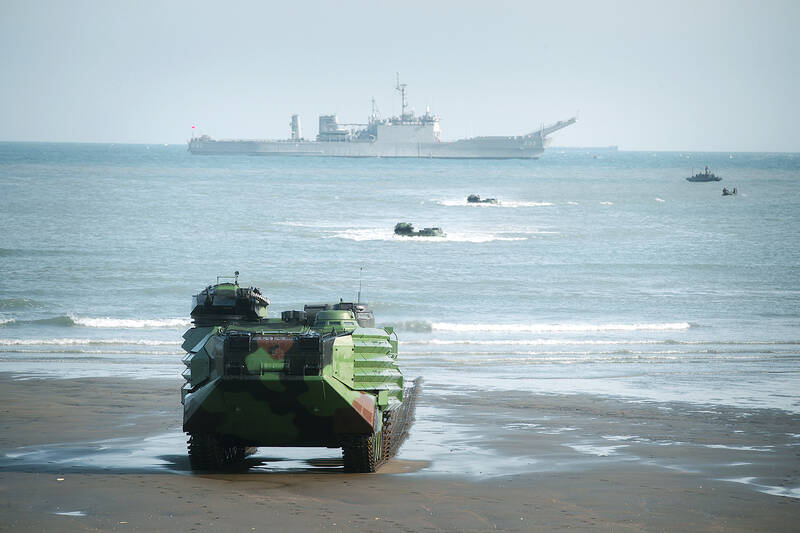The armed forces are to hold field exercises on Monday and Tuesday in coastal regions dubbed “red beaches” to train defending Taiwan proper against a multipronged amphibious attack, a defense official familiar with the matter said, speaking on condition of anonymity.
Live-fire drills are to be conducted on beaches and near shores in New Taipei City’s Tamsui District (淡水), at the Port of Taipei and in Taoyuan’s Guanyin District (觀音), a notice posted on the bulletin of the Fisheries Administration said.
The official said the exercises would test the army’s ability to react quickly and utilize mobile reserves to defend simultaneous attacks by the Chinese military on multiple fronts.

Photo: CNA
In the war game, the Sixth Army Corps would play the defending force and the 151st Fleet would be the aggressor, the official added.
If Beijing were to invade Taiwan, the Chinese military would attack in multiple coastal areas, as few beaches in Taiwan proper are suitable landing sites for amphibious operations, they said.
The field exercises are scheduled to begin the same day as the computer-assisted simulation component of the annual Han Kuang drills, which would conclude on Friday next week, the official said,
Findings from past tabletop exercises and trends seen in the Russia-Ukraine war would be incorporated into the computer-assisted portion of the drills, which would be based on the Joint Theater Level Simulation technology platform, the official said.
The possible landing sites for the Chinese military are dubbed “red beaches” among military analysts, they said.
In 2017, Ian Easton, now senior director at the US-based Project 2049 Institute, identified 14 vulnerable beaches that could be used as landing sites, the official said.
The Taiwanese armed forces recognize that such vulnerabilities exist, but do not agree with Easton’s assessment of their locations and number, they said.
Separately, the Ministry of National Defense last week told lawmakers that the army plans to buy 2,060 light machine guns for combat units for NT$428.9 million (US$13.94 million) over five years.
The weapons would be allocated to enhance frontline units’ firepower and their capability to conduct counterattacks against Chinese amphibious and airborne, air assault, infiltration and sabotage operations, it said.
A public version of the ministry’s proposed budget revealed a flurry of plans to buy arms and equipment amid a planned expansion of the army and marine corps following the implementation of one-year military conscription and the expansion of the reserves.
The budget proposals include NT$521 million for grenade launchers, automatic grenade launchers and pistols; NT$108 million for 107 81mm mortars; NT$232.2 million for chemical, biological, radiological and nuclear protective equipment; NT$1.759 billion for 10,000 night vision devices; and NT$22.8 million for 2,000 binoculars.

AIR SUPPORT: The Ministry of National Defense thanked the US for the delivery, adding that it was an indicator of the White House’s commitment to the Taiwan Relations Act Deputy Minister of National Defense Po Horng-huei (柏鴻輝) and Representative to the US Alexander Yui on Friday attended a delivery ceremony for the first of Taiwan’s long-awaited 66 F-16C/D Block 70 jets at a Lockheed Martin Corp factory in Greenville, South Carolina. “We are so proud to be the global home of the F-16 and to support Taiwan’s air defense capabilities,” US Representative William Timmons wrote on X, alongside a photograph of Taiwanese and US officials at the event. The F-16C/D Block 70 jets Taiwan ordered have the same capabilities as aircraft that had been upgraded to F-16Vs. The batch of Lockheed Martin

GRIDLOCK: The National Fire Agency’s Special Search and Rescue team is on standby to travel to the countries to help out with the rescue effort A powerful earthquake rocked Myanmar and neighboring Thailand yesterday, killing at least three people in Bangkok and burying dozens when a high-rise building under construction collapsed. Footage shared on social media from Myanmar’s second-largest city showed widespread destruction, raising fears that many were trapped under the rubble or killed. The magnitude 7.7 earthquake, with an epicenter near Mandalay in Myanmar, struck at midday and was followed by a strong magnitude 6.4 aftershock. The extent of death, injury and destruction — especially in Myanmar, which is embroiled in a civil war and where information is tightly controlled at the best of times —

China's military today said it began joint army, navy and rocket force exercises around Taiwan to "serve as a stern warning and powerful deterrent against Taiwanese independence," calling President William Lai (賴清德) a "parasite." The exercises come after Lai called Beijing a "foreign hostile force" last month. More than 10 Chinese military ships approached close to Taiwan's 24 nautical mile (44.4km) contiguous zone this morning and Taiwan sent its own warships to respond, two senior Taiwanese officials said. Taiwan has not yet detected any live fire by the Chinese military so far, one of the officials said. The drills took place after US Secretary

THUGGISH BEHAVIOR: Encouraging people to report independence supporters is another intimidation tactic that threatens cross-strait peace, the state department said China setting up an online system for reporting “Taiwanese independence” advocates is an “irresponsible and reprehensible” act, a US government spokesperson said on Friday. “China’s call for private individuals to report on alleged ‘persecution or suppression’ by supposed ‘Taiwan independence henchmen and accomplices’ is irresponsible and reprehensible,” an unnamed US Department of State spokesperson told the Central News Agency in an e-mail. The move is part of Beijing’s “intimidation campaign” against Taiwan and its supporters, and is “threatening free speech around the world, destabilizing the Indo-Pacific region, and deliberately eroding the cross-strait status quo,” the spokesperson said. The Chinese Communist Party’s “threats